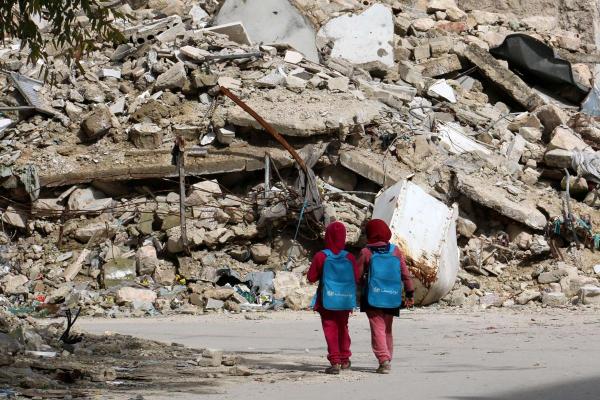On Dec. 15, Ibrahim Abdul Laith, longtime resident of Aleppo and a volunteer with the media center of the Syrian Civil Defence (known as the “White Helmets”), sat in front of his camera and pressed the record button.
“Maybe this is our last day in Aleppo,” he says, speaking softly, looking directly into the camera.
It’s a quiet morning, just a few hours into the ceasefire put into effect earlier that morning. But behind him are buildings that have been bombed into rubble, showing the neighborhood hasn’t always been so serene.
“We don’t want to leave this city,” he continues, smiling. “We won’t leave our city until it is destroyed.”
Over the past month, Syrian regime forces have advanced on the notoriously opposition-controlled eastern part of the city, going door to door, executing and arresting civilians. Their assault left at least 82 dead, according to the United Nations. Russian airplanes assisted the brutal assault, in November bombing the last remaining fully functional hospital in Eastern Aleppo out of operation. Doctors and medics were forced to care for wounded patients in makeshift, underground facilities. The weeks-long assault is a tactic many of Aleppo’s residents interpret as forcing them to flee the city that they called home.
As those inside of Aleppo prepared to leave their beloved city, Syrian President Bashar al-Assad heralded the assault as a victory.
“What is happening today is the writing of a history by every Syrian citizen,” the Syrian president announced in a video posted to his Twitter account, celebrating his regime’s territorial gains.
“The writing did not start today, it started six years ago when the crisis and war started against Syria.”
In response to the shift of the balance of power in Aleppo, Russian and Turkish officials met in Ankara early last week to broker a ceasefire, facilitating an evacuation plan for opposition fighters and wounded civilians to be transferred to the northern province of Idlib, the last urban opposition-controlled outpost left inside of Syria. Forced to choose between mandatory evacuation or certain death, residents who had stubbornly stayed in Aleppo for the past six years, hoping the brutal war that ravaged their city could end in a free Syria, began to record their final goodbyes.
Some, like Ibrahim, posted self-recorded videos on Twitter and Facebook. Others called upon the international community to reflect one last time on the human cost of ignoring their pleas for assistance in ousting Bashar al-Assad. Still others scrawled heart-breaking love notes and promises to return on what remains of the stone buildings that once made up their beloved city.
“This is one of the most difficult days in Aleppo’s history,” Ibrahim Abdul Laith told Sojourners over a series of WhatsApp voice notes. “We endured difficulties under the shelling, and under the siege, but even though the situation was difficult, we were fighting for our city.”
Later in the messages, his voice took on a somber tone.
“Now we are being asked to leave.”
The evacuation itself was logistically difficult. It failed to materialize when Iran, one of Assad’s main backers, imposed new conditions, endangering the ceasefire. Then opposition fighters refused to evacuate wounded civilians from two predominantly-Shi’ite regime-held towns — a key provision of the agreement. Finally, after struggling to salvage the deal, Turkish and Russian officials agreed upon a provision that allowed civilians loyal to the regime, who had fled the opposition, to go back to their neighborhoods.
Eventually, nearly 3,000 citizens loyal to the opposition boarded the green buses, sent to evacuate them from Aleppo.
“I don’t know if these are buses or detention centers,” one of the evacuees, who wished to remain anonymous given the rapidly changing situation, told Sojourners.
“For six hours, we have no food, no water, and no way of going to the bathroom,” they continued. “It really shouldn’t be called an evacuation. It should be called a forced displacement.”
Long before the war, Aleppo was one of the most unique and significant cities in Syria. It was a cultural hub, with a diverse population of many ethnicities and religions, and an important nexus of trade as a stop along the silk road.
During the revolution, the city’s eastern neighborhoods took on new importance as a strategic revolutionary stronghold, that, due to its size and historical significance, represented a significant victory for the opposition. It was also a beacon of hope for the opposition — that, despite years of being routinely pummeled by the regime, and later its Russian and Iranian allies, someday a free Syria could be possible.
For many Syrians, this history will be difficult to erase.
“Bashar al-Assad tried to destroy these stones, but each of these stones is a letter to someone who comes here,” Ibrahim Abdul Laith continues in his videotaped goodbye, glancing toward the piles of rubble behind him, limestone rocks that once formed the walls of his city.
“Every stone tells a story, a history of someone who has been here in Aleppo,” he finishes, his voice steady and unwavering.
“God willing, we will return.”
Got something to say about what you're reading? We value your feedback!

